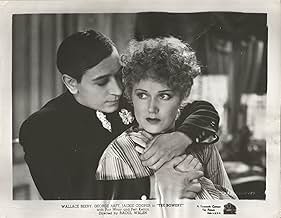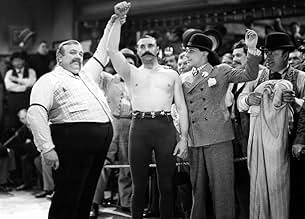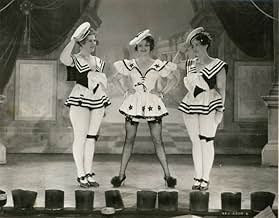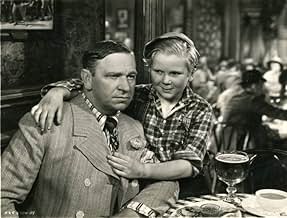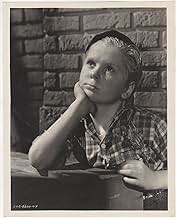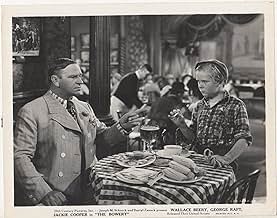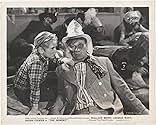Principios del siglo XX. Narra una historia ambientada en el siglo XIX en Bowery, un popular barrio de Nueva York habitado por gángsteres, matones y prostitutas.Principios del siglo XX. Narra una historia ambientada en el siglo XIX en Bowery, un popular barrio de Nueva York habitado por gángsteres, matones y prostitutas.Principios del siglo XX. Narra una historia ambientada en el siglo XIX en Bowery, un popular barrio de Nueva York habitado por gángsteres, matones y prostitutas.
- Dirección
- Guión
- Reparto principal
- Premios
- 3 premios en total
Bull Anderson
- Pug
- (sin acreditar)
Irving Bacon
- Hick
- (sin acreditar)
Lucille Ball
- Blonde
- (sin acreditar)
John Bleifer
- Mumbo the Mute
- (sin acreditar)
Phil Bloom
- Pug
- (sin acreditar)
James Burke
- Recruiting Sergeant
- (sin acreditar)
Marguerite Caverley
- Undetermined Secondary Role
- (sin acreditar)
Reseñas destacadas
High energy Raoul Walsh classic from 1933, The Bowery places saloon owner and operator Wallace Beery against bitter rival and dandy, George Raft, with adopted street kid Jackie Cooper and good looking Faye Wray in roles that play in between their big rivalry. It's not clear exactly what the rivalry is all about, but everyone follows it in the daily tabloids. Plenty of wisecracks at the beginning, but the characters soften up as the film progresses. Apart from that is the sheer exuberance of the scenes in Beery's saloon. The various characters, sexy chorus line, lots of drinking, a perfect creation of a den of iniquity not too refrained by so-called pre-code restrictions, and then later come the Carrie Nations led by Carrie Nation herself. It all creates a very vivid picture of a life that's long gone. I don't like to compare eras, but this film is completely and totally different from anything one would see today. The film has plenty of heart and long lost innocence and is absolutlely a must see.
In his new 20th Century Pictures Corporation which was at the time releasing its product with United Artists, Darryl F. Zanuck almost had an MGM trifecta for his stars. Wallace Beery and Jackie Cooper came from MGM and Clark Gable almost did. But according to the biography of George Raft from James Parrish, Raft wanted very much to do this film and Zanuck accommodated him and got him from Paramount.
It was a wise move on Zanuck's part because Steve Brodie of the Bowery was a part Raft was born to play. And why not since Raft grew up in the Hell's Kitchen area of New York and knew the scene well.
As did Raoul Walsh who was born and raised in Rockaway Beach, New York and also knew the red light areas of the city well. The best thing that The Bowery has going for it was is the incredible detail in terms of creating the atmosphere of the Gay Nineties in one of New York's most colorful areas. In fact so much detail was presented that the film is rarely seen today for all the racial epithets it has. But that would be true of the era. Racial and ethnic stereotyping was the rule of the day. In fact Ragtime is also quite graphic in that, the difference being the point of view that film takes.
What The Bowery has in atmosphere with its sets, dialog with the idioms of the day, and costumes, it loses in accuracy. Set in 1897-98 before the Spanish American War it has the legendary Steve Brodie doing his jump off the Brooklyn Bridge at that time. In point of fact it was in 1886.
Raft as Brodie and Beery as Chuck Connors are a pair of friendly if caustic rivals of The Bowery area in lower Manhattan. The two are forever trying to top each other and that is given as the reason for Raft doing his famous dive off the Brooklyn Bridge and living to tell about it. Actually there is cause in real life to think Brodie never did the deed. And in fact some question is raised in Beery's mind which leads to the climax of The Bowery.
Jackie Cooper's well known antipathy to Beery has been documented, but in the Parrish book on Raft during a fight scene Beery got a little rougher than the script called for. Raft then responded with what is described as a roundhouse right into the family jewels. Beery reacted normally as one does when one is hit there.
If one values political correctness than do not see this film. But otherwise it is an all too accurate a look on a bygone era.
It was a wise move on Zanuck's part because Steve Brodie of the Bowery was a part Raft was born to play. And why not since Raft grew up in the Hell's Kitchen area of New York and knew the scene well.
As did Raoul Walsh who was born and raised in Rockaway Beach, New York and also knew the red light areas of the city well. The best thing that The Bowery has going for it was is the incredible detail in terms of creating the atmosphere of the Gay Nineties in one of New York's most colorful areas. In fact so much detail was presented that the film is rarely seen today for all the racial epithets it has. But that would be true of the era. Racial and ethnic stereotyping was the rule of the day. In fact Ragtime is also quite graphic in that, the difference being the point of view that film takes.
What The Bowery has in atmosphere with its sets, dialog with the idioms of the day, and costumes, it loses in accuracy. Set in 1897-98 before the Spanish American War it has the legendary Steve Brodie doing his jump off the Brooklyn Bridge at that time. In point of fact it was in 1886.
Raft as Brodie and Beery as Chuck Connors are a pair of friendly if caustic rivals of The Bowery area in lower Manhattan. The two are forever trying to top each other and that is given as the reason for Raft doing his famous dive off the Brooklyn Bridge and living to tell about it. Actually there is cause in real life to think Brodie never did the deed. And in fact some question is raised in Beery's mind which leads to the climax of The Bowery.
Jackie Cooper's well known antipathy to Beery has been documented, but in the Parrish book on Raft during a fight scene Beery got a little rougher than the script called for. Raft then responded with what is described as a roundhouse right into the family jewels. Beery reacted normally as one does when one is hit there.
If one values political correctness than do not see this film. But otherwise it is an all too accurate a look on a bygone era.
Culled from the real life exploits of Chuck Connors and Steve Brodie in 1890s New York, "The Bowery" is high energy and good natured.
But be warned: Casual racial epithets flow off the tongues of Wallace Beery and little Jackie Cooper. The very first shot might be startling. This is true to the time it was set and the time it was made. And it also speaks to the diversity of population in that neck of the woods. It certainly adds to the gritty flavor of the atmosphere.
Beery as Connors is the blustering thunder at the center of the action, a loud-mouth saloon keeper with his own fire brigade. And he has a soft spot for ornery orphan Cooper. Raft as Brodie is Connors' slicker, better looking rival in almost every endeavor. Brodie could never turn down a dare and loved attention, leading up to a jump off the Brooklyn Bridge (it is still debated whether he actually jumped or used a dummy).
Beery is as bombastic as ever with a put-on Irish-American accent. He is just the gruff sort of character to draw children, cats and ladies in distress. This is possibly the most boisterous character Raft ever played, and he even gets to throw in a little dancing (as well as a show of leg). And again he mistakes the leading lady (lovely Fay Wray) for a prostitute. Cooper is as tough as either of them, though he gets a chance to turn on the tears.
The highlight isn't the jump off the bridge but a no-holds-barred fistfight between Connors and Brodie that in closeup looks like a real brawl between the principals. It's sure someone bruised more than an ego.
But be warned: Casual racial epithets flow off the tongues of Wallace Beery and little Jackie Cooper. The very first shot might be startling. This is true to the time it was set and the time it was made. And it also speaks to the diversity of population in that neck of the woods. It certainly adds to the gritty flavor of the atmosphere.
Beery as Connors is the blustering thunder at the center of the action, a loud-mouth saloon keeper with his own fire brigade. And he has a soft spot for ornery orphan Cooper. Raft as Brodie is Connors' slicker, better looking rival in almost every endeavor. Brodie could never turn down a dare and loved attention, leading up to a jump off the Brooklyn Bridge (it is still debated whether he actually jumped or used a dummy).
Beery is as bombastic as ever with a put-on Irish-American accent. He is just the gruff sort of character to draw children, cats and ladies in distress. This is possibly the most boisterous character Raft ever played, and he even gets to throw in a little dancing (as well as a show of leg). And again he mistakes the leading lady (lovely Fay Wray) for a prostitute. Cooper is as tough as either of them, though he gets a chance to turn on the tears.
The highlight isn't the jump off the bridge but a no-holds-barred fistfight between Connors and Brodie that in closeup looks like a real brawl between the principals. It's sure someone bruised more than an ego.
George Raft as Steve Brodie, the carefree, dancing gambler who can never refuse a dare, is pitted against the lumbering, sentimental, Chuck Connors (Wallace Beery).A soft touch for every panhandler, Connors impulsively adopts waifs and strays, notably runaway orphan "Swipes" (Jackie Cooper, complete with kittens!) and the homeless Lucy Calhoun, an out-of-town innocent with ambitions to become a writer.
In this male-dominated culture, communication takes place mostly in the form of violence (one sees why THE BOWERY is a Martin Scorsese favorite). Exploding cigars provide a running gag. "Swipes" enjoys throwing rocks through windows in Chinatown, on one occasion setting a laundry alight. (The simultaneous arrival of both Brodie's and Beery's volunteer fire companies leads to a brawl, during which the building burns to the ground.) Beery casually saps a troublesome girl, and thumps anyone who disagrees with him, including Brodie, whom he defeats, in a night-time fist fight on a moored barge, to regain control of his saloon, lost on a bet that Brodie wouldn't have the courage to jump off the Brooklyn Bridge. (Brodie does make the leap, but only because a subterfuge with a dummy fails at the last moment.)
As usual, Walsh fills the frame with detail, illustrating with relish the daily life of the tenderloin; singing waiters, bullying barmen, whores from Suicide Hall being hustled into the Black Maria, tailors collaring hapless hicks off the street and forcing them to buy suits they don't want. A minor but admirable little film.
In this male-dominated culture, communication takes place mostly in the form of violence (one sees why THE BOWERY is a Martin Scorsese favorite). Exploding cigars provide a running gag. "Swipes" enjoys throwing rocks through windows in Chinatown, on one occasion setting a laundry alight. (The simultaneous arrival of both Brodie's and Beery's volunteer fire companies leads to a brawl, during which the building burns to the ground.) Beery casually saps a troublesome girl, and thumps anyone who disagrees with him, including Brodie, whom he defeats, in a night-time fist fight on a moored barge, to regain control of his saloon, lost on a bet that Brodie wouldn't have the courage to jump off the Brooklyn Bridge. (Brodie does make the leap, but only because a subterfuge with a dummy fails at the last moment.)
As usual, Walsh fills the frame with detail, illustrating with relish the daily life of the tenderloin; singing waiters, bullying barmen, whores from Suicide Hall being hustled into the Black Maria, tailors collaring hapless hicks off the street and forcing them to buy suits they don't want. A minor but admirable little film.
I love this freekin movie! Walsh is a true master of the cinematic form, his film have been sometimes in my opinion, overlooked. But this film is a favourite of mine because it really gives you the feel of the time the film was set in.\
All the wonderful characters that existed, the lifestyle, the mode of dress, the way they spoke, OK they might be exaggerated, but it is good to know that there were occasion when two men tried to outdo each other with insane stunts.
I just felt it was apiece of history thats should be wathced by many people and appreciated because of that fact.
Can I get it somewhere on DVD? I have only seen it on TV. But for anyone wanting a slice of life movie about that period of time this is the perfect one.
All the wonderful characters that existed, the lifestyle, the mode of dress, the way they spoke, OK they might be exaggerated, but it is good to know that there were occasion when two men tried to outdo each other with insane stunts.
I just felt it was apiece of history thats should be wathced by many people and appreciated because of that fact.
Can I get it somewhere on DVD? I have only seen it on TV. But for anyone wanting a slice of life movie about that period of time this is the perfect one.
¿Sabías que...?
- CuriosidadesGeorge Raft and Wallace Beery were at odds during filming. According to Raft, before the fistfight scene, Beery asked Raft to let him throw the first punch and then proceeded to sucker-punch Raft, knocking him out for several minutes. "When I came to I got up and called him everything I could think of," Raft said. They then fought for real, and the crew had to break it up.
- PifiasThe name of George Raft's character, "Steve Brodie," is misspelled "Brody" in the opening credits.
- Citas
Steve Brodie: Don't ever say I never give ya nothin'.
- Versiones alternativasThe version shown on Fox Movie Channel runs seven seconds over 87 minutes. Apparently it is a reissue copy, the missing five minutes due to reediting to fit post code rules. Though it was made for Twentieth Century Films, a new start up film studio organized by Joe Schenck, Bill Goetz (L.B. Mayer's son-in-law) and ex-Warner Bros. production chief Darryl Zanuck, the FMC version is presented under the post merger logo of Twentieth Century Fox complete with fanfare and an end title crediting distribution to TCF. This year a full uncut version was shown at New York's Film Forum which clocked several minutes over ninety minutes.
- ConexionesEdited into Brooklyn Bridge (1981)
- Banda sonoraThe Bowery
(uncredited)
Music by Percy Gaunt
Lyrics by Charles Hale Hoyt
Sung by a chorus at the beginning
Played often in the score
Selecciones populares
Inicia sesión para calificar y añadir a tu lista para recibir recomendaciones personalizadas
- How long is The Bowery?Con tecnología de Alexa
Detalles
Taquilla
- Presupuesto
- 421.496 US$ (estimación)
- Duración
- 1h 32min(92 min)
- Color
- Relación de aspecto
- 1.37 : 1
Contribuir a esta página
Sugerir un cambio o añadir el contenido que falta

